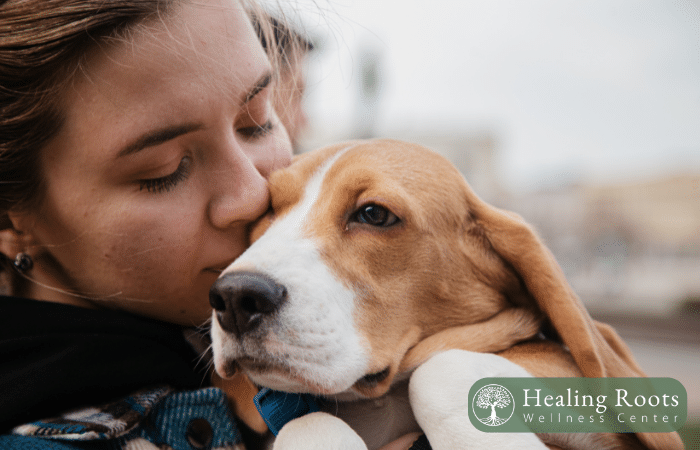
The loss of a pet can be just as devastating as losing a close friend or family member. Yet, unlike traditional grief, many pet owners find themselves mourning in silence, struggling with emotions that society often fails to recognize.
Friends and coworkers may say, “You can always get another pet.” Others might not acknowledge your loss at all, as if grieving for an animal isn’t something to take seriously. But for those who have loved a pet deeply, their loss is profound—impacting daily life, emotional well-being, and even physical health.
This kind of disenfranchised grief—grief that isn’t widely recognized or validated by society—can leave pet owners feeling isolated, questioning whether their pain is “justified.” But grief doesn’t need permission. The love you shared with your pet was real, and your loss deserves to be acknowledged.
The grief that follows the death of a pet is unique. It’s not just about missing them; it’s about the deep void they leave behind.
Pets offer something rare in human relationships—pure, unconditional love. They don’t hold grudges, judge, or expect anything beyond food, care, and companionship. Their presence is comforting, their routines predictable, and their affection unwavering. When they’re gone, the absence of that steady love can feel crushing.
For many, pets are not just companions; they are ingrained into daily life:
When they pass, these routines are suddenly shattered. The quiet house, the missing food bowls, the empty space on the couch—these daily reminders of their absence can make their loss feel even more overwhelming.
One of the most difficult aspects of pet loss is making end-of-life decisions. Whether due to illness, injury, or old age, many pet owners face the heart-wrenching responsibility of deciding when it’s time to say goodbye.
This can lead to feelings of guilt, doubt, and second-guessing:
These emotions can complicate grief, making it harder to find closure.
Unlike traditional grief, pet loss is often dismissed by those who don’t understand the depth of the human-animal bond. This can make grieving even more painful.
Many people simply don’t understand how much a pet can mean. While there are sympathy cards and bereavement policies for human loss, pet loss is rarely acknowledged in the same way.
Because pet loss isn’t always recognized, many people grieve alone. They may avoid talking about their pain for fear of being dismissed or told, “It was just an animal.”
This can make healing more difficult, as grief thrives on connection and support. Without validation from others, pet owners may suppress their emotions, leading to prolonged sadness, guilt, and even physical symptoms of grief.
Grief doesn’t follow a timeline, and there is no “right way” to mourn. However, there are steps you can take to process your loss and honor the bond you shared with your pet.
Your grief is real. Your pet mattered. It’s okay to feel deep sadness, anger, or even guilt. Allow yourself to grieve without minimizing your emotions.
Honoring your pet’s memory can be a powerful step in the healing process. Consider:
One of the hardest parts of disenfranchised grief is feeling like you have to grieve in silence. Talking about your pet—whether with friends, family, or in a support group—can help keep their memory alive.
If you don’t feel comfortable sharing with others, journaling about your pet can be a personal way to process your emotions.
If you’re struggling with your grief, connecting with others who understand can be incredibly healing. Options include:
Healing is not about forgetting your pet—it’s about finding a way to move forward while keeping their love and memory alive.
If you’re struggling with the loss of a pet, know that your pain is real, your emotions are valid, and you don’t have to go through this alone. Grief takes time, and healing doesn’t mean forgetting—it means learning how to carry the love you shared in a new way.
If you need support, therapy can help. You don’t have to minimize your loss or carry your grief in silence. There is space for your emotions, and you deserve to be heard.
Disclaimer: At Healing Roots Wellness Center, we’re committed to supporting your mental well-being with professional care and guidance. The information shared in this blog is for educational and informational purposes only and is not intended as a substitute for personalized mental health support or medical advice, diagnosis, or treatment. While we are qualified mental health professionals, we do not diagnose medical conditions. If you have specific concerns about your health or well-being, we encourage you to seek advice from the appropriate healthcare provider. Healing Roots Wellness Center does not endorse any specific tests, products, procedures, or opinions mentioned in the blog. Reliance on the information provided is solely at your own risk. Remember, your mental health journey is unique, and the right support can make all the difference.
At Healing Roots Wellness Center, we’re committed to supporting your mental well-being with professional care and guidance. The information provided throughout our website – including blog posts, articles, and other content – is for educational and informational purposes only. It is not intended as a substitute for personalized mental health support or professional medical advice, diagnosis, or treatment. While we are qualified mental health professionals, we do not diagnose medical conditions. If you have specific concerns about your health or well-being, we encourage you to seek advice from the appropriate healthcare provider. Healing Roots Wellness Center does not endorse any specific tests, products, procedures, or opinions mentioned on our website. Reliance on the information provided is solely at your own risk. Remember, your mental health journey is unique, and the right support can make all the difference.
Whether you’re ready to schedule a free consultation or just have a few questions before getting started, you’re in the right place.
Pilar offers a compassionate, safe space to explore the impact of trauma, relationship wounds, anxiety, overwhelm, and the everyday pressures of life. If you’re longing for more authentic connection — with others and with yourself — this form is your first step.

Whether you’re seeking support for anxiety, chronic illness, trauma, parenting stress, or something else entirely — this is a safe and simple first step.
This short form will help us get to know what kind of care you’re looking for and match you with the best clinician for your needs. You can choose someone specific from our team or let us help place you with a therapist who aligns with your goals and preferences.
You’ll also have the chance to select the areas you’d like support with — whether that’s just one specialty or several.

